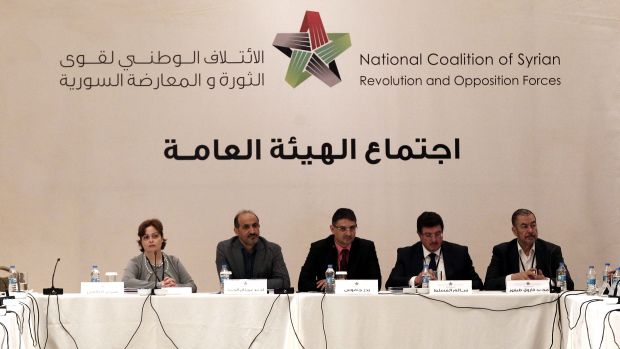
Member National Coalition Of Syria Suheir Atassi, Head of the Syrian National Coalition, Ahmad al-Jarba, Secretary General National Coalition of Syria Badr Jamous, Member National Coalition Of Syria, Salim Muslit, Leaders of the exiled Syrian National Council (SNC), Muhammet Faruq Tayfur during a Syrian opposition groups meeting in Istanbul, Turkey, 09 November 2013. (EPA/SEDAT SUNA)
Amid widespread internal disagreements, the Coalition has previously insisted that it will not attend the conference without an assurance that Syrian president Bashar Al-Assad will step down from power, on Saturday a spokesman said that it may reconsider its stance if Syria’s main international ally, Russia, presses Assad to take the negotiations seriously.
Coalition Spokesman Khalid Salih said: “We have always said that we fully support the Geneva II conference, but we are concerned about going if Assad’s government is not serious in implementing it.”
He added that “everyone knows the Assad regime will try to win time and kill more Syrian civilians,” and that “we do want to go to Geneva but everyone has to be serious, not just the Assad regime, but also its ally, Russia. We want Russia to exert more pressure on Damascus.”
He pointed to the fact that Russian pressure had succeeded in persuading the Syrian government to agree to the dismantling of its chemical weapons.
The Coalition’s leadership is currently meeting in Istanbul to decide on the issue of the peace conference, and to work on proposals for an interim government.
It is due to consider the issue of attending the conference in more detail on Sunday, said Mohamed Sarmini, a member of the Coalition and one of its most prominent components, the Syrian National Council.
Members of the Coalition have agreed to adopt its leader Ahmad Al-Jarba’s position–which he announced at the Arab League foreign ministers meeting in Cairo last week–as a basis for making a decision on the participation in Geneva II.
Member of the Political Bureau of the Coalition, Ahmad Ramadan, told Asharq Al-Awsat that “our position is in harmony with that of Jarba’s at the Arab League foreign ministers meeting in Cairo, and his position at the London meeting.”
He added that “the Coalition consider Geneva II to be a process of transition of power which will result in the formation of a transitional governing body with full political, executive, security and military powers, according to UN Resolution 2118.” He also said “the Syrian regime must announce its recognition of this commitment.”
Security Council Resolution 2118 endorses the “Geneva Communique”, drawn up at an international conference on Syria in the city in 2012, which identified a number of steps starting with the formation of a transitional governing body with full executive powers, and which includes members of the current government, the opposition and other groups.
Meanwhile, Sarmini said there was no conflict between different constituents of the Syrian opposition about the principle of Assad’s departure, and that there was “concern about the failure of the regime to implement the decisions of the conference,” and that “there must be an international power which guarantees its implementation.”
Ramadan said “those who met the Russians a few days ago, do not represent the Syrian opposition,” and that “we are talking about the opposition forces who support the revolution, not some people who disagreed with the regime over an issue or personal interests,” in reference to former Deputy Prime Minister Qadri Jamil, who was dismissed by Assad for meeting with US and Russian diplomats without authorization.
The Saturday meeting also discussed a possible interim government, including proposals on its membership. Opposition sources, speaking on condition of anonymity, told Asharq Al-Awsat that the interim government would include interior and defense portfolios, in addition to finance and service portfolios. The foreign ministry portfolio was not included.
The sources added that the most likely candidate for the defense position was As’ad Mostafa, who was a possible candidate for the presidency of the interim government. Ammar Al-Qirbi is the most prominent candidate for the interior post, although he has met some objection.
